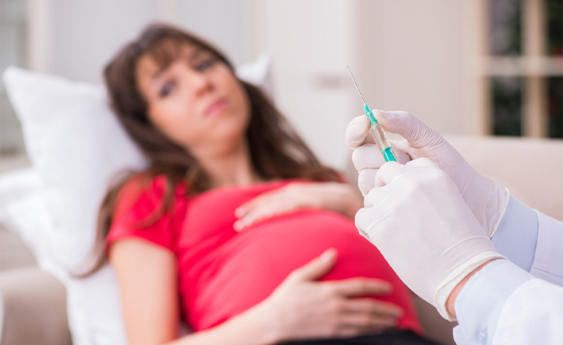PREGNANCY
As a pregnant woman, are you still resisting getting vaccinated?
Before the annual flu season, many children and elderly people choose to be vaccinated against influenza. Although pregnant women are also at high risk for influenza, many pregnant women are worried or very resistant to vaccination because of their concerns about their babies. In fact, vaccinating against influenza during pregnancy is not only harmless to your baby, it also has unexpected benefits.
In recent years, the vaccine has been continuously exposed for “skeleton in closet”, and people don’t trust it as much as they used to. When it comes to vaccines, people immediately think of many adverse reactions after vaccination. Many pregnant women will feel that compared with the dangerous vaccines, flu is just a cold and it will pass anyway. However, it is important to know that the threat of the flu and the common cold is not at a level.
Flu is more dangerous than you think.
Influenza is an acute respiratory infectious disease caused by a virus. It can be transmitted through droplets and contact. The virus is highly contagious and spreads quickly. Studies show that pregnant women are 17.3 times more likely to be hospitalized with influenza virus than non-pregnant women [1].
According to the relevant data of previous influenza pandemics [2] and seasonal influenza [3], infection with influenza virus during pregnancy can cause negative effects on both mother and developing fetus. Compared with ordinary women, pregnant women are more likely to develop severe cases and even die after being infected with the influenza virus. In addition, infection with influenza virus during pregnancy may also cause placental dysfunction. It will cause the failure to deliver sufficient oxygen and nutrients to the developing fetus, thereby affecting the growth of the fetus [4], and damaging the organ structure or function of the developing fetus [5] . At present, the vast majority of vaccinators are well tolerant of inactivated influenza vaccines, and only a few experience discomfort such as mild fever. Therefore, compared to the slight side effects that are unlikely to occur after a vaccination, the influenza virus is far more dangerous to a pregnant mother.
Mother and Baby Two-Way “Protective Umbrella”
Despite a low vaccination rate among pregnant women in China, the flu vaccine is indeed a powerful umbrella for pregnant women against influenza viruses. Studies have found that flu shots reduce the risk of getting hospitalized by the flu by about 40% of pregnant women. In addition to significantly reducing the risk of influenza in pregnant women, antibodies can also be passed to the fetus through the placenta after the flu vaccine, protecting the fetus for a period of time after birth when the infant cannot be vaccinated (baby within 6 months has weak immunity and cannot be vaccine against influenza). The U.S. Centers for Disease Control and Prevention states that influenza vaccination of pregnant women reduces the risk of flu-related hospitalization for infants under 6 months by an average of 72%.
Evidence for Vaccine Safety
Even so, some pregnant women may still be upset. Is it really safe to get a vaccine during pregnancy for preventive purposes? Are there any side effects? Regarding these, expectant mothers can be assured. Remember, the flu vaccine is an inactivated vaccine, in which the virus has been killed. It is no longer toxic and infectious, and only retains its immunogenicity. In addition, the influenza vaccination of pregnant women dates back to 1957 in the United States. The US Centers for Disease Control and Prevention (CDC) conducted a long-term follow-up observation of the safety of vaccinations for pregnant women, and found that influenza vaccination in pregnant women has never been associated with adverse perinatal outcomes or severe side effects [6].
In addition, the current vaccination for influenza covers the first, second and third trimesters of pregnancy, and no relevant evidence shows that it will have an adverse effect. Therefore, pregnant women can be assured of vaccination.
It needs to be reminded that before vaccination, pregnant women must explain their physical condition, and get vaccinated under the guidance of a doctor, usually vaccination once every 1-2 months before the flu season. If they have an allergic reaction to any component of the flu vaccine, vaccination is not recommended.
References
[1] Schanzer DL, Langley JM, Tam TW. Influenza Attributed Hospitalization Rates among Pregnant Women in Canada 1994-2000[J]. J Obstet Gynaecol Can, 2007, 29(8): 622
[2] Rasmussen SA, Jamieson DJ, BreseeJS. Pandemic Influenza and Pregnant Women [J]. Emerg Infect Dis, 2008, 14(1): 95-100
[3] Dodds L, McNeil SA, Fell DB, et al. Impact of Influenza Exposure on Rates of Hospital Admissions and Physician Visits Because of Respiratory Illness among Pregnant Women [J]. CMAJ, 2007, 176(4): 463-468
[4] Fatemi SH, Folsom TD, Rooney RJ, et al. The Viral Theory of Schizophrenia Revisited: Abnormal Placental Gene Expression and Structural Changes with Lack of Evidence for H1N1 Viral Presence in Placentae of Infect Edmiceor Brains of Exposed Offspring [J]. Neuropharmacology, 2012, 62(3): 1290-1298
[5] Brown AS, Begg MD, Gravenstein S, et al. Serologic Evidence of Prenatal Influenza in the Etiology of Schizophrenia [J]. Arch Gen Psychiatry, 2004, 61(8): 774-780
